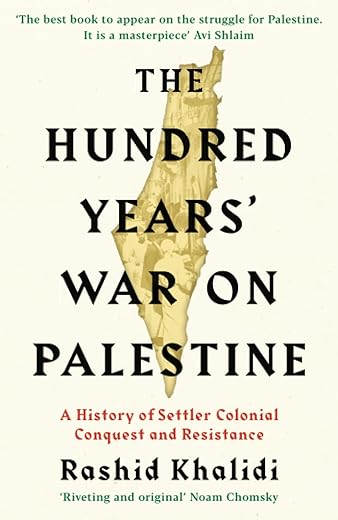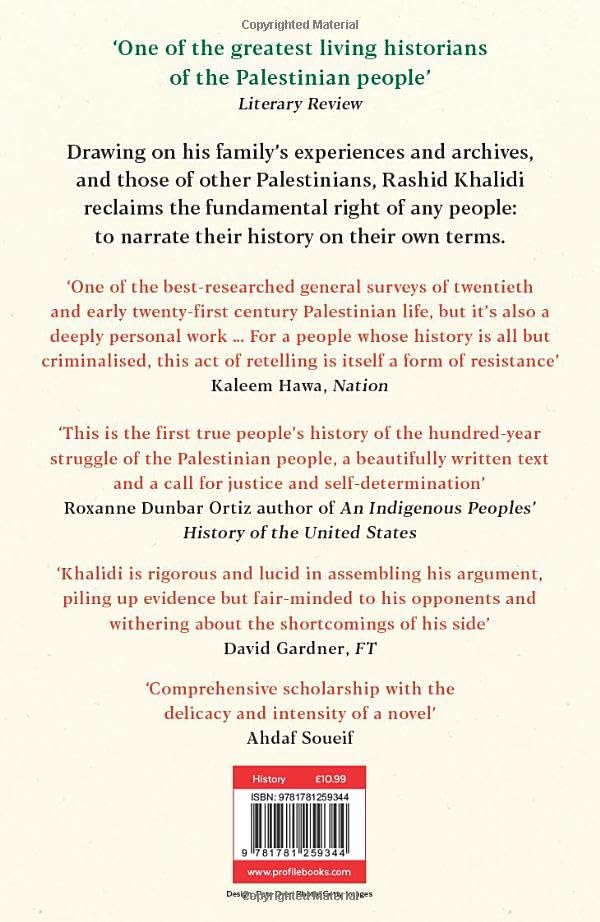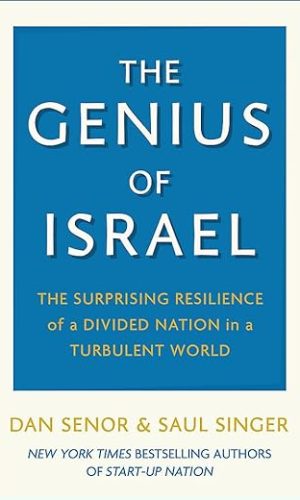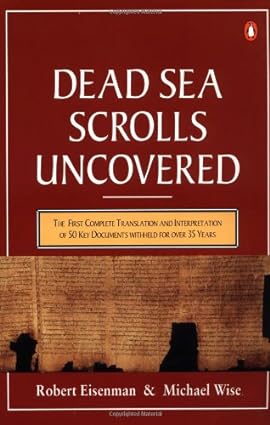The Hundred Years’ War on Palestine: The New York Times Bestseller
£9.60£10.40 (-8%)
THE NEW YORK TIMES BESTSELLER
Shortlisted for the 2020 Cundill History Prize
‘Riveting and original … a work enriched by solid scholarship, vivid personal experience, and acute appreciation of the concerns and aspirations of the contending parties in this deeply unequal conflict ‘ Noam Chomsky
The twentieth century for Palestine and the Palestinians has been a century of denial: denial of statehood, denial of nationhood and denial of history. The Hundred Years War on Palestine is Rashid Khalidi’s powerful response. Drawing on his family archives, he reclaims the fundamental right of any people: to narrate their history on their own terms.
Beginning in the final days of the Ottoman Empire, Khalidi reveals nascent Palestinian nationalism and the broad recognition by the early Zionists of the colonial nature of their project. These ideas and their echoes defend Nakba – the Palestinian term for the establishment of the state of Israel – the cession of the West Bank and Gaza to Jordan and Egypt, the Six Day War and the occupation. Moving through these critical moments, Khalidi interweaves the voices of journalists, poets and resistance leaders with his own accounts as a child of a UN official and a resident of Beirut during the 1982 seige. The result is a profoundly moving account of a hundred-year-long war of occupation, dispossession and colonialisation.
Read more
Additional information
| Publisher | Profile Books, Main edition (3 Sept. 2020) |
|---|---|
| Language | English |
| Paperback | 336 pages |
| ISBN-10 | 1781259348 |
| ISBN-13 | 978-1781259344 |
| Dimensions | 12.9 x 2.13 x 19.8 cm |











by Interested customer
An interesting refresher on the detailed history of the problems in Palestine. Whilst obviously pro Palestinian, it still comes across as an accurate and measured assessment of the history of the troubles. An excellent read.
by postgrad
This book charts the key stages in the dispossession of the Palestinian people by Zionists, assisted in particular by Britain and the United States, over the course of one-hundred years. It’s a fluent historical account which succeeds in being simultaneously scholarly and very readable. It is also up to date and ends with President Donald Trump’s recognition of Jerusalem as Israel’s capital (which as Khalidi notes was entirely consistent with the great powers’ history of disposing of Palestinian history, identity, culture and worship without even the pretence of consultation).
It has a number of advantages over other books on the subject. The author is able to draw on texts in Arabic which lie outside the competence of many writers on this subject. Secondly, Rashid Khalidi was born into an elite Palestinian family, and the story of dispossession is a very personal one. He describes how his grandparents were forced out of their home by Jews in 1948 and how the ruins of their house still stand abandoned on the outskirts of Tel Aviv, preserved only because of a link to an early Zionist settler. He includes a photograph of the ruins of his brother’s home in the West Bank, bulldozed by the Israeli military. Thirdly, Khalidi’s family background gave him privileged access to many key figures in the twentieth century Palestinian struggle for justice, including the novelist Ghassan Kanafani and the PLO leader Yasser Arafat. Finally, as history, this is a balanced, humane and objective book which is not afraid to address failings on the Palestinian side. Khalidi is prodigiously well-read and draws on a vast range of sources.
His central thesis is that the modern history of Palestine can best be understood as a colonial war waged against the indigenous population by a variety of parties, to force them to relinquish their homeland to another people against their will. In the course of this narrative history Khalidi deconstructs many myths about Palestine promoted by apologists for Israel. He identifies the early evidence for Palestinian identity and nationalism. As long ago as 1914, even before the Balfour Declaration, perceptive Palestinians saw the implications of European Zionism, writing ‘We are a nation threatened by disappearance.’ Zionism was always a sly, racist ideology which had at its heart a desire to expel all Palestinians from their land. It is a process which has continued now for over a century, and Khalidi records its progress in dispassionate detail. This is not, as so many books on the subject are, a polemical work but rather a scholarly accounting. Khalidi shows how the brutality of the Israeli state was preceded by the barbarism of the British military occupation of Palestine – tying civilians to the front of armoured cars and trains, demolition of homes, the execution of prisoners and resistance fighters, detention without trial, and the deportation of political leaders. Violent repression was paralleled by a political process which pretended to consider the Palestinian aspiration for nationhood while all the time giving the Zionist movement the right of veto. The bad faith of successive British governments was later replaced by the bad faith of successive US administrations. One of Khalidi’s arguments is that it is delusional to think that the USA is some kind of neutral arbiter, the ‘honest broker’ who can bring the two sides together. Donald Trump merely continues a process which began long ago.
There is a great deal of forgotten history in this book, including the regular massacres which Israel has carried out against Palestinian civilians. In November 1956, in Khan Yunis and Rafah, for example, more than 450 civilians were summarily executed. Khalidi identifies such atrocities as part of a pattern of behaviour by the Israeli military, which can usually rely on a compliant Western media to ignore, downplay or sanitise such killings.
The book ends with a paradox. After a century of dispossession the Palestinians are a broken people, imprisoned in fragments of a country which was once theirs, at the mercy of a bellicose, self-righteous and viciously repressive settler state, which has the ultimate goal of expelling every single one of them. At the same time the Palestinian cause is better-known and stronger than it has ever been, as knowledge of the true nature of the Zionist state and its pitilessly sectarian ideology becomes better known through the medium of print and, more recently, social media. Whereas Zionism was once able to pass itself off as a progressive movement it is now much more easily identifiable as a colonial enterprise which has always been sponsored by states which have no interest whatever in democracy or human rights. Rashid Khalidi recalls a demonstration he attended in 1967 outside Yale Law School, where Golda Meir had been invited to speak. She received a rapturous reception from her audience, while the protesters outside consisted of the author and three others. If this was repeated today the protest would be very much greater because over the past half century the ongoing displacement of the Palestinians from their land has been accompanied by a growth in awareness of why Israel is a pariah state, like apartheid South Africa. A book like this one adds to this growth in consciousness and is to be commended for its balance, its comprehensiveness and its impressive range of sources.
by Peter
As a third culture kid who born in Africa and lived in three African countries including MENA by the time I was ten. This sparked interest in the area as a whole and the frequent unreported injustices against the Palestinian people. Which I chose as part of my studies when I finally went to University at the age of 48.
It was interesting to learn the history of the region from the early days of the Muslim Brotherhood through to Hamas. All the time never mentioning the disgraceful behaviour of the Haganah, Stern Gangs and Irgun, British French and latterly the USA.
The author so rightly lays the blame for so many of the Palestinian elderly men and woman, together with those of younger women and children squarely on the Israeli Defence force and the USA for supplying arms to a those forces within Israel, so they can be used against innocent elderly women and children, in order to continue a land, and to run an apartheid fascist state. Hopefully anyone reading this book including those by President Jimmy Carter, Stephen Sizer, Ian Black and Ilan Pappe, will wake up to the disgraceful behaviour against the Palestinians for 140years since the birth of Zyanism in the 1880.
It is time for the west to wake up and stop wringing their hands in shame over the holocaust, and finally stand up to the Israeli Government and the Israeli Defence Force and try them for the numerous war crimes they are guilty of. Sadly until the Israeli government admit their atrocities and allow the subject of atrocities to be on the table for any peace settlement to be achieved. Sadly it is very obvious that the current Government has no interest in peace, all the time that America and the west including the biased Western media are allowing them to continue to behave the way they are.